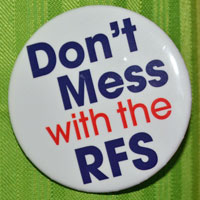Big Oil is continuing its attack on the Renewable Fuel Standard (RFS), with continued efforts to end the mandate. The biofuels industry had been hopeful after the Super Bowl (the Baltimore Ravens won in case you missed it) that fans who saw the ad by Dodge about American’s farmers would help them realize how important these providers of fuel are to our nation. However, Brian Jennings, Executive Vice President of the American Coalition for Ethanol (ACE) notes that is it no surprise that Big Oil, held a “Cheap Corn Coalition” press event a day later.
 Jennings notes that the RFS is working and has been the most effective policy enacted by Congress to reduce foreign oil imports. When the RFS went into effect in 2006, said Jennings, oil imports stood at 60 percent. In 2012, net oil imports fell to less than 40 percent. Jennings also points out that unlike oil, ethanol is not subsidized and wholesale prices of ethanol are still 40 to 50 cents per gallon less expensive than unleaded gasoline. Consumers, said Jennings, would pay more at the pump if the RFS is repealed, and the U.S. would return to relying on the rest of the world for more expensive forms of fossil fuel.
Jennings notes that the RFS is working and has been the most effective policy enacted by Congress to reduce foreign oil imports. When the RFS went into effect in 2006, said Jennings, oil imports stood at 60 percent. In 2012, net oil imports fell to less than 40 percent. Jennings also points out that unlike oil, ethanol is not subsidized and wholesale prices of ethanol are still 40 to 50 cents per gallon less expensive than unleaded gasoline. Consumers, said Jennings, would pay more at the pump if the RFS is repealed, and the U.S. would return to relying on the rest of the world for more expensive forms of fossil fuel.
“Big Oil built the “blend wall,” by refusing to take any steps toward meeting the RFS while they instead spent millions of dollars on lawsuits and PR efforts like the one they staged again today,” said Jennings. “Even reporters ask if there is anything new in their message. There isn’t – because big oil continues to spend its considerable financial and political capital to block the use of ethanol in gasoline. The RFS was enacted in-part to help break through the blend wall by enabling consumers to have access to more affordable and cleaner choices at the pump.
Jennings says there also continues to be considerable rhetoric and time spent discussing E15 and small engines. “It is illegal for small engines to use E15,” explained Jennings. “EPA approved E15 for the majority of motor vehicles on the road today but did not approve the fuel for non-road engines in part because these engines are not advanced enough to take advantage of ethanol-blends. Small engine owners, including marine equipment owners, should not use E15.”
Jennings added that corn production has expanded and become more efficient since enactment of the RFS. Even with last year’s drought, global grain production still reached one of the largest production totals ever, and ethanol is slated to use about three percent of that total on a gross basis, returning one-third of the corn we process to livestock producers as a valuable feed.
“While these ethanol opponents continue to cast themselves as being concerned about all sorts of different issues, they simply want to eliminate competition for their products. The Cheap Corn Coalition lives to spread even more misinformation,” concluded Jennings.

